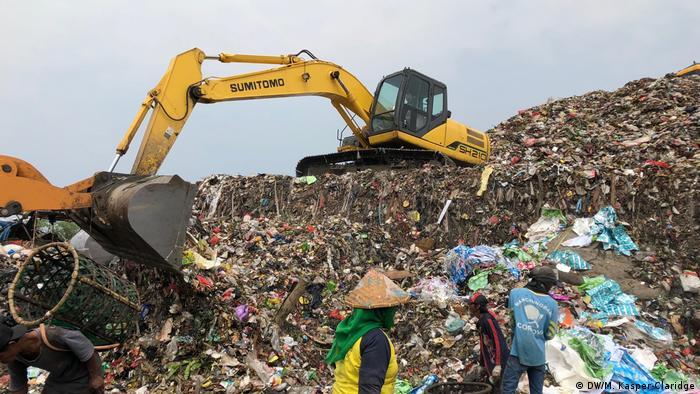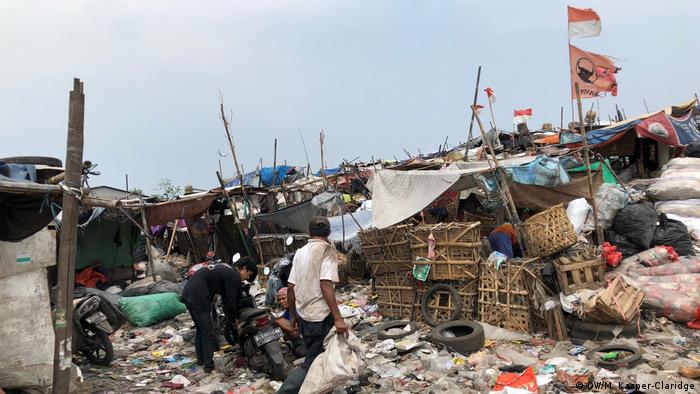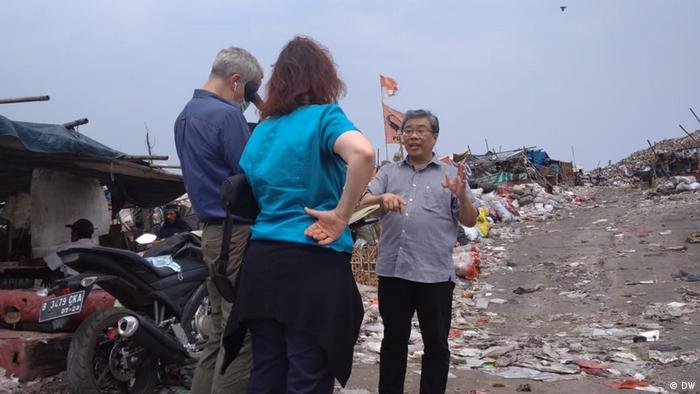Plastic waste is dirty, increasingly, rivers, and fills up landfills. In Jakarta, two men want to offer an Alternative, the impact on the environment and the economy could have, not only in Indonesia.

The stench is unbearable. The midday heat burns on the open dump near the Indonesian city of Tangerang in the greater Jakarta area. Huge cockroaches scurrying across the 35-acre site and minute-by-minute rolling load of cars and bring tons of new garbage. Excavator stacking it higher and higher. In between slaving for a few hundred garbage collectors in the mercilessly hot sun. You are looking for recyclable plastic bags or plastic parts.
Sugianto Tandio shakes his head, given the huge amount of plastic waste. “Every day about 1500 tons will be brought to the solid waste here and 15 to 20 percent of which are plastic,” the engineer says. However, conventional plastic requires approximately 500 to 1000 years before it disintegrates. The plastic waste is stacked in Tangerang, remains so for many generations as an environmental problem.
Plastic in fish
“Today, a third of the fish of the sea, of micro plastic. Imagine this: Every Time you sea animals to eat, it is so, as were three fish in front of you and you would have to decide what you want to eat, and what you prefer to stand.” This is not a Problem, could we leave to our children, says Tjiptadjaja. “It really depends on us. Our Generation is the Generation that must act.” Together with Tandio of the Chicago-trained Economist who founded Greenhope, a company that Alternatives to conventional plastic developed.

Garbage collectors in Tangerang, Indonesia
“Ecoplas” is the name of one of your products. It looks like plastic, but is biodegradable. “It is a biodegradable Polymer that we manufacture from Tapioca,” explains Tandio, who has worked for years in the development of this product, and the corresponding patents. He proudly shows plastic bags, plastic Cutlery and even a specially for the US-developed a bag that collects the legacies of dogs. Everything biodegradable.
The two entrepreneurs were awarded in 2013 by the Geneva-based Schwab Foundation “Social Entrepreneur Award” and their work is also recognised internationally. Tapioca is made from the dried cassava root, which is also known as Cassava. The cultivation of the Plant is particularly common in tropical countries. Nigeria, Thailand, Brazil, Indonesia and Ghana are the largest producers. Use as a plastic kit could be for many small-scale farmers who grow cassava, an additional source of income, Tandio is convinced.
Plastic bags banned
Since then, more and more countries ban the use of plastic bags or additional costs, the interest in possible Alternatives. Tjiptadjaja and Tandio worldwide are invited to conferences and background discussions. One of them was just on the big the Our Ocean Conference in Bali, the other to discussions with the government of Malaysia. Also from Kenya and a few Latin American countries came to Ask.

In the DW-Interview: Sugianto Tandio of Greenhope
Indonesia wants to, at the latest, prohibit 2020 petroleum-made plastic bags. Now you can find biodegradable Alternatives by Greenhope in a number of Indonesian super markets and shops. “Ecoplas – Cassava-based degradable plastic” is written on the bags, which are to be distinguished at first glance from the conventional plastic bags. Greenhope has today 50 employees and all signs are pointing to growth.
However, the production is still comparatively expensive. A biodegradable plastic bag costs in the production of almost twice as much as a harmful to the environment. The consumers therefore consider carefully, whether you spend money on eco-friendly “plastic”bags.
Cheap Alternatives
Tjiptadjaja and Tandio working to reduce the costs as far as possible, and build your small research Department. One of their solutions is an additive that you are “OXIUM”. He ensures that conventional plastic is decomposed after only two years. The plastic is still on the Basis of petroleum and non-renewable plant-based raw materials, but the price for Oxium offset plastic is only between two and five percent over the conventional plastic. It is not an ideal solution, but a step forward, especially for poorer countries, the use of Oxium is a cheap Alternative, my the entrepreneur. Now Greenhope sold it to South Africa, Malaysia and in other countries.
Stability and protection
For the open dump in Tangerang Greenhope with Oxium offset cover has plastic sheeting in the offer. You can reduce the bad odours, under which the inhabitants of the surrounding villages and the city of leiden, and at the same time the growing mountain of waste to stabilize, because again and again it comes to crashes. More than two Plan year has not been able to sell the company to the TPA, the operator of the dump, but so far.
Tandio shakes his head and looks at the large, wobbly mountain of waste. Actually, the new waste has to be covered every day with a Plan, he says, but the operators, unfortunately, too expensive.